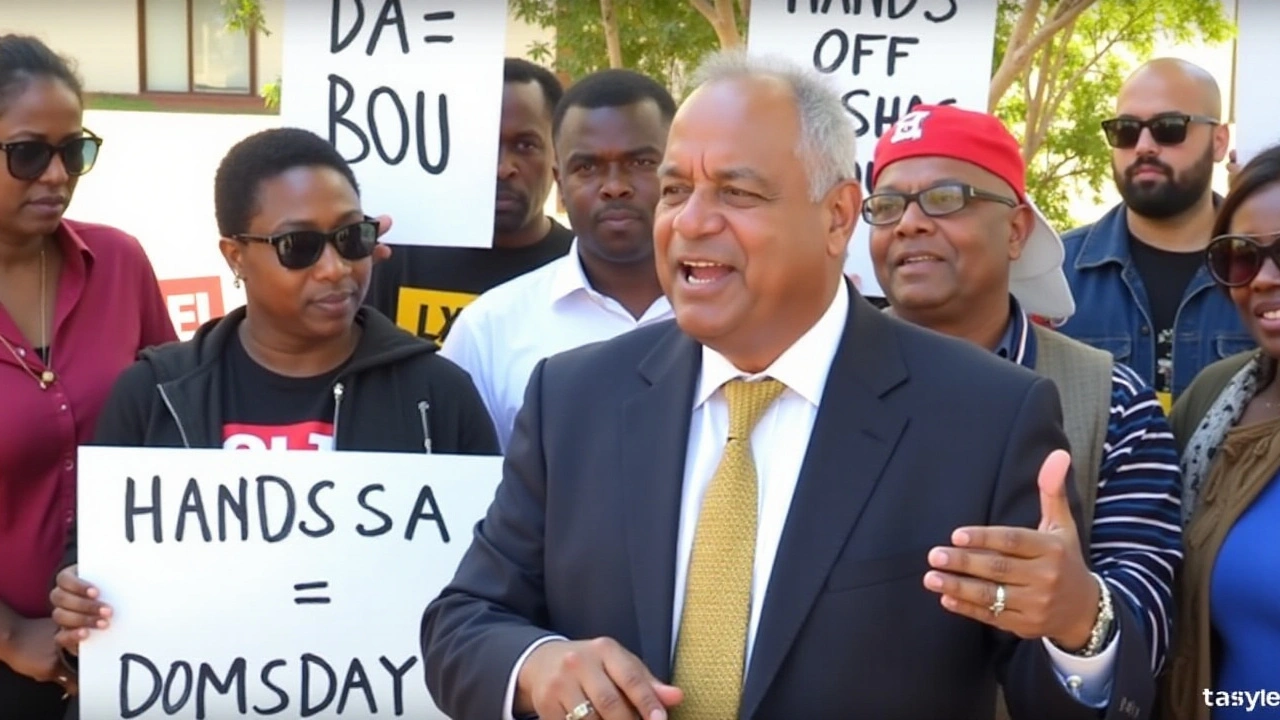National ANC leaders have paved the way for major political upheaval in Tshwane by greenlighting a motion of no confidence against Mayor Cilliers Brink. The decision has thrust both the African National Congress (ANC) and Brink's party, the Democratic Alliance (DA), into the spotlight as they battle over the future direction of the city. After 18 months in office, Brink's leadership has been challenged by local ANC members who accuse him of failing to address critical issues such as service delivery and infrastructure development.
The ANC in Tshwane has been increasingly vocal about their dissatisfaction with Brink's performance as mayor. They argue that his administration has not made adequate progress in improving the day-to-day lives of the city’s residents, citing ongoing problems with public services and stagnant infrastructure projects. According to ANC officials, Brink's tenure has been marked by inefficiencies and a lack of tangible results, prompting them to push for his removal from office.
Despite these claims, Brink and the DA have staunchly defended his record. They assert that the motion to oust him is politically motivated, designed to undermine the progress he has made in enhancing the city's governance. The DA points to several initiatives launched under Brink’s leadership, which they claim have begun to bear fruit in terms of better service delivery and more transparent administration. They highlight improvements in waste management, road maintenance, and community engagement as evidence of Brink's positive impact on the metro.
The highly contentious vote of no confidence took place on September 26, 2024. With national ANC leadership granting their approval, local ANC caucus members were empowered to push forward with the motion. The lead-up to the vote saw heated debate and intense lobbying from both sides. Proponents of the motion emphasized the necessity of new leadership to tackle the city's persistent challenges, while opponents decried what they saw as a strategic move to destabilize the DA's governance in Tshwane.
Ultimately, the outcome of the vote was not in Brink’s favor. Despite his and the DA's efforts to rally support and present a case for continuity, the motion of no confidence carried through. Cilliers Brink was removed as mayor, setting the stage for a new chapter in Tshwane’s political landscape. The aftermath of the vote has left the city in a state of uncertainty, with residents and officials alike anxiously awaiting the appointment of new leadership and the direction they will take in tackling Tshwane’s many pressing issues.
This decision has significant implications not just for local governance but also for national politics. The ANC’s successful bid to unseat a DA mayor could embolden the party to pursue similar actions in other municipalities where they face opposition control. It also brings into sharp focus the ongoing battle for political dominance at various levels of government in South Africa.
The State of Service Delivery and Infrastructure Under Brink
The crux of the ANC’s argument against Cilliers Brink rests on his purported failure to improve service delivery and infrastructure in Tshwane. They argue that the city has experienced numerous disruptions and inefficiencies in public services, from waste collection to water supply. Residents have expressed frustration with the sporadic nature of these essential services, which they believe should be reliably provided.
Infrastructure development has also been a contentious issue. The ANC claims that under Brink’s administration, several key projects have stalled, leaving the city with aging and inadequate facilities. The failure to upgrade and maintain infrastructure has allegedly led to increased costs and decreased productivity, impacting both residents and businesses in the area.
Brink’s supporters, however, paint a different picture. They argue that he inherited a city plagued by years of mismanagement and corruption and that turning things around was always going to be a long-term endeavor. According to them, Brink has laid the groundwork for future improvements by instituting measures to combat corruption and streamline service delivery processes. They cite examples where his policies have begun to make a difference, such as the implementation of more efficient waste management systems and the repair of critical roadways.
Political Motivations Behind the Motion
Amid the competing narratives, the DA has been vociferous in its assertion that the motion of no confidence is fueled by political motivations rather than genuine concerns about governance. They argue that the ANC’s move to unseat Brink is part of a broader strategy to regain control of strategic municipalities ahead of national elections. This, they believe, is an attempt to weaken the DA’s influence and consolidate the ANC’s power at various levels of government.
Analysts have noted that such political maneuvering is not uncommon in South Africa’s complex landscape. Local governance battles often reflect wider national power struggles, with parties seeking to gain the upper hand through strategic moves on the ground. The removal of Brink is seen by some as a tactical victory for the ANC, one that might have ripple effects beyond Tshwane. It is anticipated that similar scenarios might play out in other DA-led municipalities, as the ANC looks to leverage its political muscle.
The question of what comes next remains a pressing one for Tshwane. With Brink out of the picture, the ANC will now have the opportunity to install its own candidate as mayor. Whoever takes the helm will face the immediate challenge of addressing the very issues that led to Brink’s ousting. The residents of Tshwane will be watching closely, hoping for meaningful change and real improvements in their daily lives.

The Impact on Tshwane Residents
The political drama surrounding Cilliers Brink’s removal has not been lost on the residents of Tshwane. Many have expressed mixed feelings about the developments, with some supporting the ANC’s push for new leadership and others lamenting what they see as a disruptive and politically driven maneuver. For many, the primary concern remains the state of the city’s public services and infrastructure, issues that have a direct impact on their quality of life.
There is a tangible sense of frustration among residents over the frequent service delivery interruptions and the sluggish pace of infrastructure development. While some believe fresh leadership could bring a new approach and renewed focus on these issues, others are skeptical, worried that political infighting will overshadow the needs of the community. The effectiveness of the incoming mayor in addressing these concerns will be critical in shaping public perception of the ANC’s decision.
In conclusion, the motion of no confidence against Cilliers Brink represents a significant moment in Tshwane’s political dynamics. It underscores the ongoing struggle between major political parties for control and influence at the local level. As the city moves forward, the hope is that the incoming administration can rise above the political fray to deliver on the promises of improved governance and better services for all residents. The coming months will likely be a period of adjustment and, hopefully, progress as Tshwane navigates this new chapter in its history.

